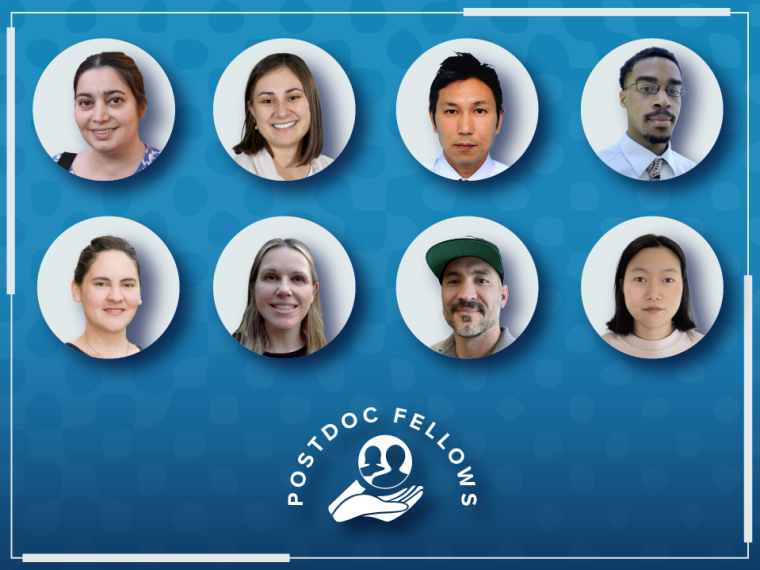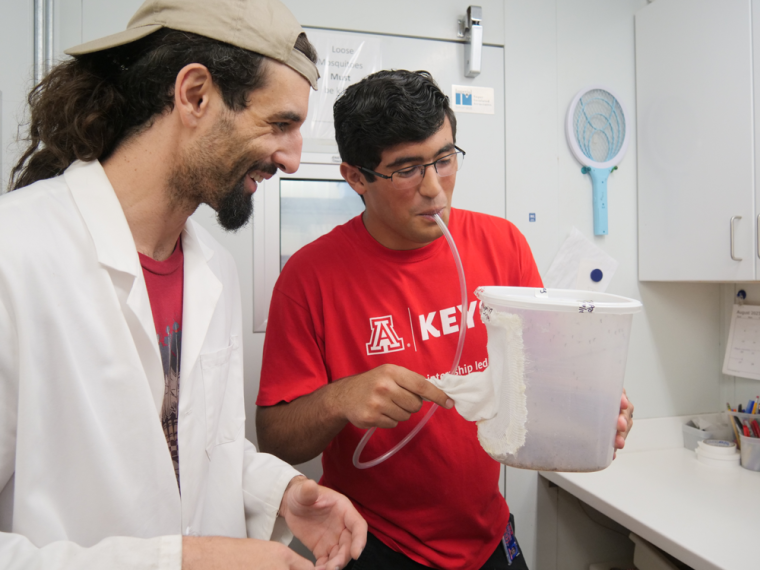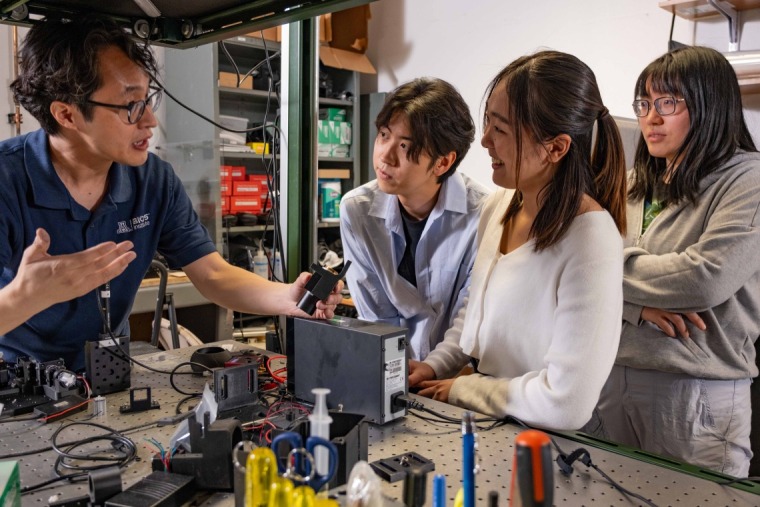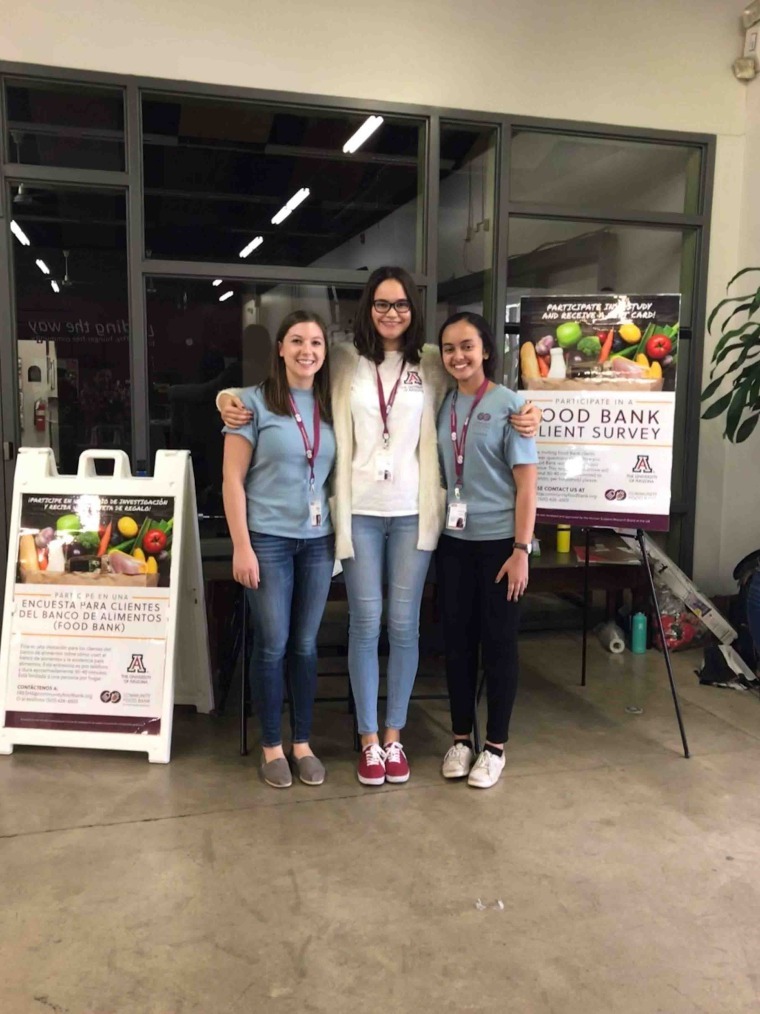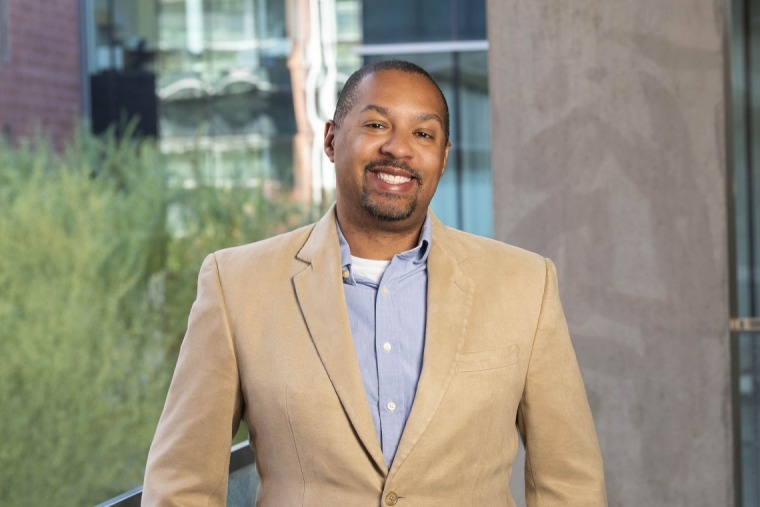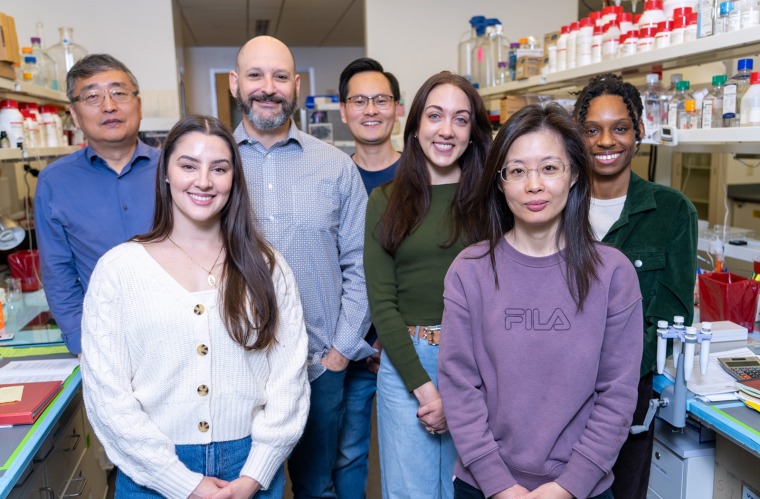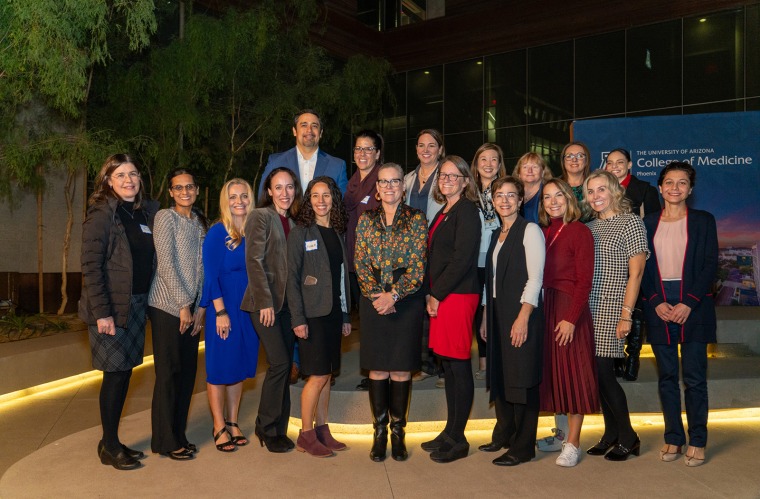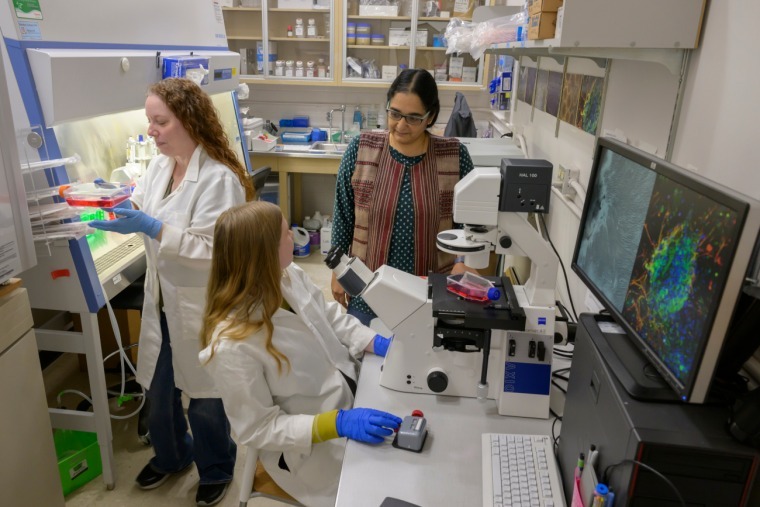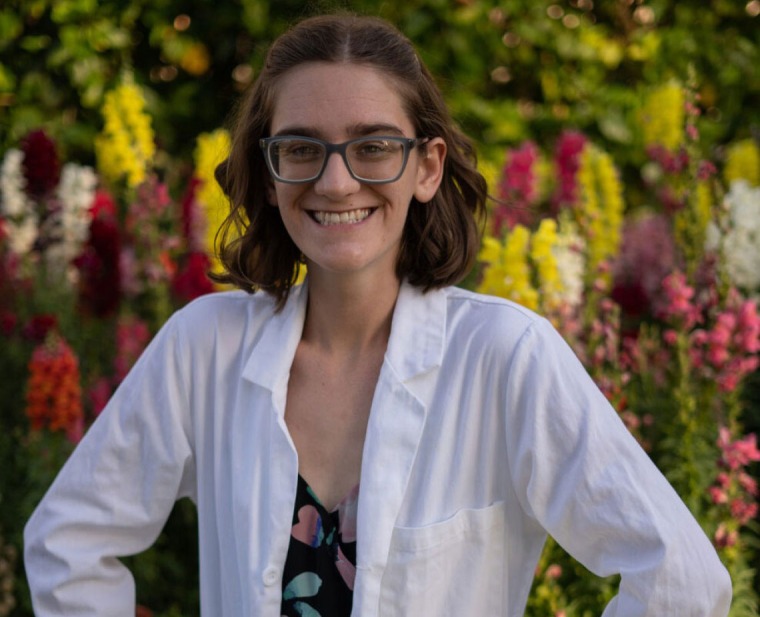Now in its sixth year, this competitive fellowship through the University of Arizona BIO5 Institute provides exceptional postdoctoral researchers with monetary awards and professional development opportunities.
Since 2019, over 40 BIO5 Postdoctoral Fellows have been awarded $5,000 each to advance their scientific projects and gain the skills they need to become independent researchers in their respective fields. The award can be used to learn new skills in workshops, travel to conferences, or visit peer labs to further collaborations. Each fellow works with a BIO5 member as a primary mentor and forms a mentoring committee that assists them with grant applications, career advice, and job talk preparations.
The 2024 BIO5 Postdoctoral Fellows are: Marjan Aghajani, Angela Greenman, Atsushi Ishii, David Jordan, Zoe Lyski, Gemma Purser, Philip Yost, and Ran Zhang.
Seeing a need to invest in the success of postdoctoral researchers, BIO5 member Michael D.L. Johnson, associate professor in the Department of Immunobiology at the UArizona College of Medicine – Tucson, established the fellowship with support of BIO5 leadership to support cross-disciplinary projects aligned with the BIO5 mission.
The Technology and Research Initiative Fund (TRIF) that helped launch BIO5 more than 20 years ago continues to be a catalyst in enabling effective, cross-disciplinary bioscience research, innovation, and impact at the university and in supporting the next generation of scientists through training opportunities like the BIO5 Postdoctoral Fellowship.
Learn about the 2024 Fellows and their interdisciplinary research
Marjan Aghajani, PhD
Proposal Title: The role of the ER stress-inducible ribosome-binding protein 1 (RRBP1) in cardiomyocyte protection during ischemic stress
BIO5 Member & Principal Investigator: Shirin Doroudgar, Department of Internal Medicine, UArizona College of Medicine – Phoenix
Heart problems caused by narrowed heart arteries, or ischemic heart disease, can affect the signaling pathways and survival of the cardiac muscle cells responsible for the contraction of the heart. It's critical to understand the molecular mechanisms of these cells and pathways to prevent cell death and the resulting stress placed on the cardiovascular system.
With a background in medical physiology, immunology, and cell biology, Marjan Aghajani is pursuing a research career focused on studying abnormal changes in body functions caused by cardiovascular disease.
“I want to understand how cardiac muscle cells, or myocytes, respond to stressful challenges. My vision is that such responses could become the basis of new therapies for heart diseases that stress cardiac myocytes,” said Aghajani.
Aghajani will use the BIO5 Postdoctoral Fellowship to study the molecular mechanisms involved in ischemic heart disease. Using human induced pluripotent stem cells (hiPSCs), she will focus on the role of ribosome-binding protein 1 (RRBP1) in cardiomyocyte survival under ischemic stress. The funds and mentorship will help her gain expertise in hiPSC culturing and differentiation and present her work at a heart research conference.
Angela (Angie) Greenman, PhD
Proposal Title: Quantifying the super-relaxed state of myosin
BIO5 Member & Principal Investigator: Samantha Harris, Department of Physiology, UArizona College of Medicine – Tucson
Understanding the molecular mechanisms of muscle contraction can lead to a better outcome of hypertrophic cardiomyopathy (HCM), a prevalent cause of heart failure in adults.
Using her expertise in molecular biology, physiology, and muscle function, Angie Greenman plans to use her BIO5 Fellowship to further her career goals of becoming an independent scientist studying and teaching how skeletal and cardiac muscle function in health, disease, and under the stress of exercise.
"I want to study the effects that cardiac and skeletal muscle proteins have on regulating contraction and relaxation in normal physiology and testing these same proteins under the stress of pathology and under the demands of exercise,” said Greenman.
Greenman will use the BIO5 Postdoctoral Fellowship to expand her laboratory skills, particularly in fluorescent microscopy techniques related to muscle function, to study the role of cardiac myosin binding protein-C (cMyBP-C) in muscle contraction and relaxation. Funding will allow her to visit with an expert in the field at the University of Copenhagen, learning novel techniques for characterizing different states of myosin during relaxation that opens doors to new avenues of research in her field.
Atsushi Ishii, MD, PhD
Proposal Title: Gaining tools to probe the dynamics of brain stem cell regeneration during aging
BIO5 Member & Principal Investigator: Lalitha Madhavan, Department of Neurology, UArizona College of Medicine – Tucson
Understanding the effects of aging and sex hormones on neurogenesis is important for a deeper understanding of various cranial nerves and psychiatric diseases. Some central nerve diseases develop in a variety of age-dependent manners and go into spontaneous remission, while others, such as autism spectrum disorder, develop from birth and progress chronically, and others, such as Parkinson's disease and Alzheimer's disease, develop in old age. Some symptoms develop and progress over time, and symptoms change with age.
With his long-standing interests in neurological disorders and a background working as a pediatric neurologist, Atsushi Ishii wants to research regenerative approaches for addressing age-related neurological disorders.
“Working on neurodevelopmental disorders previously in a clinical setting, I became intrigued with the role of age-dependent changes in these contexts, which although important, were less appreciated and studied,” said Ishii.
Ishii will use the BIO5 Postdoctoral Fellowship to investigate the molecular pathways associated with the aging of neural stem progenitor cells (NSPCs), particularly focusing on the NRF2 transcription factor and its interaction with sex hormones. He plans to visit an expert in the field at Tohuku University in Japan to learn about NRF2 biology and cutting-edge methods, as well as attend a conference around stem cell research to network and present his work.
David Jordan, PhD
Proposal Title: Preliminary biomechanical evaluation of the concurrency of carpal tunnel syndrome and trapeziometacarpal osteoarthritis
BIO5 Member & Principal Investigator: Zong-Ming Li, Department of Orthopedic Surgery, UArizona College of Medicine – Tucson
Millions of people are afflicted with carpal tunnel syndrome and osteoarthritis, musculoskeletal disorders of the hand and wrist.
David Jordan's mechanical engineering expertise, along with his background in physiology, bioengineering, medical imaging, and computer modeling, gives him a unique multidisciplinary perspective on the biomechanical study of the hand and wrist.
“My current research focus involves the imaging, testing and modeling of the trapeziometacarpal joint, which is the most affected hand joint by osteoarthritis. I aim to develop novel therapeutic treatment mechanisms for this disorder,” said Jordan.
Using the BIO5 Postdoctoral Fellowship funds, Jordan will study the concurrency of carpal tunnel syndrome and osteoarthritis. He wants to identify and recruit patients with concurrent cases of these disorders and construct apparatuses for testing hand function. Jordan also plans to attend conferences focusing on orthopedic research and biomechanics to jumpstart his independent research career.
Zoe Lyski, PhD
Proposal Title: Uncovering mechanisms behind suboptimal immunity in immunocompromised individuals
BIO5 Member & Principal Investigator: Deepta Bhattacharya, Department of Immunology, UArizona College of Medicine – Tucson
As the ongoing COVID-19 pandemic has shown, people do not develop equally protective immune responses to infection and vaccination, and those with immunocompromising conditions and cancer are especially at risk.
With expertise in immunology and virology, Zoe Lyski will use the BIO5 Postdoctoral Fellowship to further study how immune responses influence viral evolution.
“There is an unmet need to uncover key drivers of suboptimal immunity and develop means of improving vaccine immune responses in immunocompromised patients. My project aims to help fill this knowledge gap,” said Lyski.
Her project supported by the BIO5 Postdoctoral Fellowship will focus on understanding suboptimal immunity in cancer patients, particularly regarding antibody responses to vaccination and subsequent viral evolution. Funds will help develop targeted mRNA vaccine approaches to improve outcomes in immunocompromised patients and allow her to travel and present her research at an immunology conference.
Gemma Purser, PhD
Proposal Title: Investigating the role of urban forest soils in mitigating atmospheric volatile organic compound driven air pollution in cities
BIO5 Member & Principal Investigator: Laura Meredith, School of Natural Resources and the Environment, College of Agriculture, Life & Environmental Sciences
Volatile organic compounds (VOCs) contribute to air pollution, which has implications for human health particularly in urban areas. The presence of VOCs in the atmosphere has a variety of sources, but of rising concern are those originating from personal care items, cleaning products, and industrial solvents.
Specializing in atmospheric and analytical chemistry, Gemma Purser wants to further her understanding of microbial analysis and urban ecosystems to better study VOCs.
“This fellowship offers a unique opportunity to explore critical questions at the intersection of urban ecology, atmospheric chemistry, and microbiology. I am excited about the potential impact of this research on understanding the role of urban forest soils in buffering the newly emerging sources of atmospheric volatile organic compounds in cities,” said Purser.
Using funds from the BIO5 Postdoctoral Fellowship, Purser will start a collaborative independent research project with Urban Biogeochemistry program at Boston University and Aerodyne Research, Inc. (ARI) to study the interplay between urban green spaces and volatile organic compounds in improving air quality. She will use the funds to conduct soil experiments using advanced mass spectrometer instrumentation at ARI and work with Boston University to further develop her microbial analysis techniques.
Philip Yost, PhD
Proposal Title: Biomimetic 5-module chimeric antigen receptor therapy
BIO5 Member & Principal Investigator: Michael Kuhns, Department of Immunology, UArizona College of Medicine – Tucson
When our immune system works correctly, it deploys T cells to detect and eliminate viruses, bacteria, and other organisms that cause disease. However, sometimes these cells go rogue, attacking healthy cells and causing autoimmune diseases such as Type 1 diabetes.
With an extensive background in cellular and developmental biology, Philip Yost wants to have a meaningful impact on human health research using a novel approach – biomimetic engineering – to genetically engineer cells that can lead to new immunotherapy treatments.
“Since joining the Kuhns lab in fall 2022, I have successfully established a workflow for a second-generation chimeric antigen receptor as a platform to expand from just the treatment of Type 1 diabetes and extend as an application for treatments against other diseases,” said Yost.
Yost will use the BIO5 Postdoctoral Fellowship to design and develop a second-generation biomimetic chimeric antigen receptor (CAR) for T-cells in immunotherapy, capable of redirecting T-cells effectively. He will use the funds to enhance his immunology training through advanced courses and attending conferences.
Ran Zhang, PhD
Proposal Title: A fluorescence-based high throughput screening assay to target the Nsp14 ExoN of SARS-CoV-2
BIO5 Member & Principal Investigator: Hongmin Li, Department of Pharmacology & Toxicology, R. Ken Coit College of Pharmacy
Emerging and evolving coronaviruses present challenges to researchers as they must continually advance their understanding of antiviral therapies.
With her expertise in veterinary medicine, microbiology, and virology, Ran Zhang aims to provide valuable insights into potential antiviral drug development for coronaviruses.
“Given the current global emphasis on antiviral research, particularly considering recent pandemics, there's a heightened demand for professionals with specialized knowledge in antiviral drug development. I want to contribute to groundbreaking discoveries that can have a profound effect on public health,” said Zhang.
With the BIO5 Postdoctoral Fellowship, Zhang will research the role of non-structural protein 14 (nsp14) in coronaviruses' replication, particularly SARS-CoV-2, and develop a high-throughput screening assay to identify inhibitors of nsp14 activity. The funds and mentorship allow Zhang to design, implement, and test experiments that will help her understand viral replication mechanisms and add to the development of antiviral therapies.


